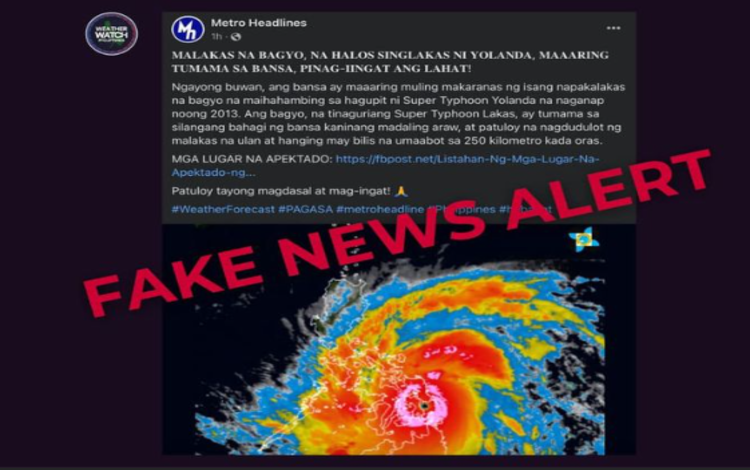The Philippine Atmospheric, Geophysical and Astronomical Services Administration (Pagasa) has dismissed reports circulating online that a super typhoon named “Lakas” has hit the country. According to Pagasa, the supposed super typhoon, allegedly as strong as Super Typhoon Yolanda (international name: Haiyan) which devastated the Philippines in November 2013, does not exist.

In an official statement, Pagasa clarified that “Lakas” is not included in the list of names designated for tropical cyclones that may enter or form within the Philippine area of responsibility (PAR) for 2024. This assertion contradicts the claims made in a widely shared social media post that alleged the existence of this powerful storm.
The viral post claimed that “Lakas” had peak wind speeds or gustiness of up to 250 kilometers per hour and affected the southern part of the Philippines. However, when users clicked on the link attached to the post, which supposedly detailed the areas affected by “Lakas,” they were redirected to an online shopping site, revealing the post to be a hoax.
Earlier on Thursday, Pagasa addressed the issue, reiterating that the low-pressure area (LPA) last located off the coast of Samar has a low chance of developing into a tropical cyclone. This update aims to quell public anxiety and prevent the spread of misinformation regarding weather disturbances.
Pagasa’s Strong Denial: ‘Lakas’ is Non-Existent
Pagasa issued a firm statement against the false information, emphasizing that there is no truth to the reports about a super typhoon named “Lakas.” The agency cautioned the public against believing unverified information from non-credible sources.
“Reports about ‘Lakas’ are completely unfounded. We urge the public to rely on official updates from Pagasa and not to be misled by sensational posts on social media,” Pagasa said.
A particular Facebook page, Metro Headlines, was identified as the source of the misleading post. This page claimed that a super typhoon named “Lakas” was set to hit the eastern part of the Philippines, likening it to the strength of Super Typhoon Yolanda. However, Pagasa debunked this claim, pointing out that the satellite image used in the post was that of Yolanda. Additionally, the link included in the post directed users to an affiliate online shopping site, further proving that the information was fabricated.
Pagasa also highlighted that Metro Headlines is not a recognized news agency, urging the public to exercise caution and verify information from reputable sources before sharing or believing in such reports. The agency continues to monitor weather patterns and provide timely updates to ensure public safety and preparedness.
